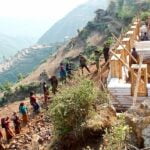Smita Magar,
Jhumlawang, 24th January 2013
“I hope nurses and doctors will come soon,” Nar Bahadur Sunar says with a wistful smile, “Then no one will have to go through the nightmare my wife and I had to.” His hopes are high after the Community Health Center in the village formally kicked off with the basic health services from October.
Six years back, Nar Bahadur’s 41 year-old wife Bhim Kumari had a miscarriage which nearly took her life. It was her fourth miscarriage. This miscarriage left her critically ill for more than a year. The frequent miscarriage Bhim Kumari suffered was due to the lack of care and regular check-ups. Such luxuries, in terms of the safety of mother and unborn child during pregnancy, were out of question as there were no hospitals nearby.
She was four months pregnant when she lost her child, again. She was suffering from heavy blood loss and an unimaginable pain that left her unconscious for days. Nar Bahadur carried her on his back for two days to reach the hospital in district headquarter Khalanga for treatment. “On the way I would anxiously wait for her to groan,” he says, “heart breaking as it was to hear but it conformed she was alive.”
 When they reached the district hospital at Khalanga, Bhim Kumari was almost non-responsive. The medicine needed for her treatment was not available at the hospital so they had to wait for one more day to get the medicine from Kathmandu on a helicopter. After few days she was referred to Mahendra hospital in Dang. Five more days of walk took them to the hospital and she stayed there for a month to recover.
When they reached the district hospital at Khalanga, Bhim Kumari was almost non-responsive. The medicine needed for her treatment was not available at the hospital so they had to wait for one more day to get the medicine from Kathmandu on a helicopter. After few days she was referred to Mahendra hospital in Dang. Five more days of walk took them to the hospital and she stayed there for a month to recover.
Now, a healthy woman, Bhim Kumari is using contraceptives and is mother of 3 children. Nar Bahadur says he is still unable to pay back the loan he took for hospital charges. “Seems like this loan will extend to our children,” he says with a frown across his forehead. But in a second his frown changes into a broad smile as he looks at his wife and pronounces, “But, she is alive!”
Not everyone is lucky. The lack of health center or a hospital nearby has left many lives bereft and grief-stricken in the village. Almost every delivery takes place at home, alone, without skilled birth attendants, risking the lives of both mother and newborn child. Poverty, lack of awareness, early marriage and early motherhood leads to the complications. Preventive reproductive health issues become a challenge while many lives are lost due to lack of proper care and timely diagnosis.
 The pain of losing a wife and an infant of Til Bahadur hit Kamara Shrestha in 2009 when his wife died because of childbirth complications. She already had suffered from two complicated deliveries and newly born children had died soon after birth. “Compared to other women Dhokashari had weak health and each child birth left her weaker and sicker,” Kamara says.
The pain of losing a wife and an infant of Til Bahadur hit Kamara Shrestha in 2009 when his wife died because of childbirth complications. She already had suffered from two complicated deliveries and newly born children had died soon after birth. “Compared to other women Dhokashari had weak health and each child birth left her weaker and sicker,” Kamara says.
So, when Dhokashari, 28, got pregnant again Kamara wanted to go for a check-up. But, they were building a house and days were comparatively busier. “She didn’t want to go for check-ups,” he says, “She used to say that the hospital was too far.”
During delivery, traditional midwives were called but they were not able to help. The infant had died in the womb and there was excessive bleeding. After struggling for two long days Dhokashari was barely conscious. With her health further deteriorating, in the middle of the night, Kamara carried her in a basket to take her to district hospital Salle. She breathed her last breath at Chhing; a place far from home, a place far from the hospital.
“Every day I pray that even my enemy should not have to go through such pain,” Kamara says. And, with a health post in a village, he is happy his prayer is in a process of being answered. “I am very happy. Now, our women will be able to go for regular check-ups and get long-needed help in time,” he adds with a smile.
Kamara’s hopes and smile touches Til Bahadur’s who believes the new generation will not have to suffer the way they had to with the hospital in the village. “Now, we are just in need for good doctors and nurses,” he smiles, “I hope they will come soon.”


